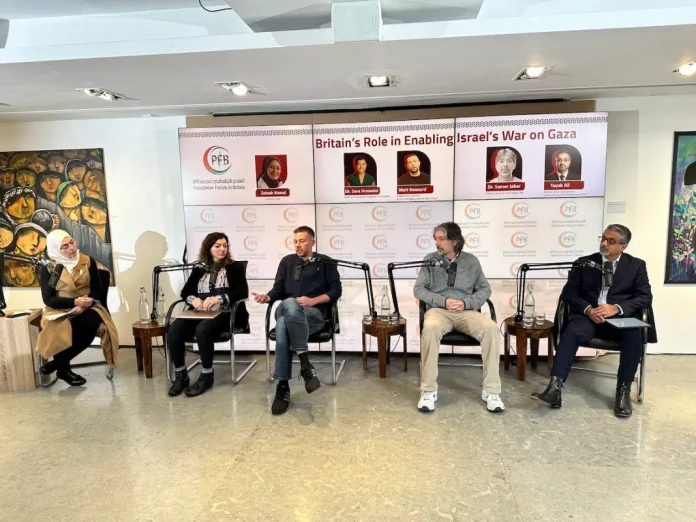The UK has played a role in Israel’s war on Gaza, while efforts have been taken to suppress media coverage of its actions, speakers at a London seminar told attendees on Wednesday.
Organised by the Palestinian Forum in Britain (PFB) and hosted by Zeinab Kamal, the seminar brought together journalists, legal analysts, and human rights advocates in a discussion of how Britain’s military, financial, and diplomatic engagement with the Israeli occupation helped to facilitate Israel’s war on Gaza.
As per the Middle East Monitor report, investigative journalist Matt Kennard highlighted how a D-notice had been issued on 28 October to suppress media coverage of British special forces in Gaza. A leaked New York Times report confirmed that UK spy teams had been gathering intelligence that Israel, as quoted by an Israeli official, “could not collect on its own”. Despite these revelations, however, British media outlets have remained silent and have reinforced what Kennard called “a media blackout”.
Criticising the Labour Government’s decision to partially suspend 30 out of an estimated 350 arms exports licences to Israel as “window dressing”, Kennard pointed to the huge role the British military was undertaking in Gaza. He noted that 47 percent of all reconnaissance flights over Gaza were conducted by the UK, twice as many as Israel’s own. He added that the UK’s legal liability has been called into greater question given the stonewalling of parliamentary questions around the nature of Britain’s military surveillance. He stressed that UK intelligence has likely enabled war crimes and called for full legal scrutiny, particularly regarding the SAS’s 15-month unaccounted deployment.
British human rights lawyer and Director of the International Centre for Justice for Palestinians (ICJP), Tayab Ali, explained how diplomatic manoeuvres and arms exports have directly facilitated Israel’s war on Gaza. He condemned Britain’s continued arms sales to Israel despite mounting evidence of war crimes, arguing that these actions demonstrate the UK’s active participation in the war.
Ali denounced the government’s chronic inability to enforce international law, especially regarding accountability mechanisms like the International Criminal Court (ICC) or similar investigations. He urged civil society and advocacy groups to heighten the pressure through legal actions, grassroots mobilisation, sanctions and judicial challenges against Britain’s complicity.
Political activist and researcher Dr. Samer Jaber focused on the financial ties between UK institutions and Israeli banks that fund settlement expansion, emphasising that these financial lifelines are essential to sustaining Israel’s settler-colonial project. Jaber called for immediate legislation to cut off these financial lifelines, asserting that the most effective way to hold Israel accountable is through divestment and economic sanctions.
Director of the British-Palestinian Committee (BPC), Dr. Sara Husseini, placed the discussion in a broader context, noting the increasing repression of pro-Palestinian activism in the UK. She warned of upcoming political moves aimed at normalising Israeli apartheid, including the revival of the Abraham Accords and the bypassing of Palestinian institutions in reconstruction efforts. She called for sustained pressure on UK MPs, the need for Palestinian-led initiatives in policy spaces, and emphasised the importance of building a broad, multi-front movement to challenge the UK’s role.




